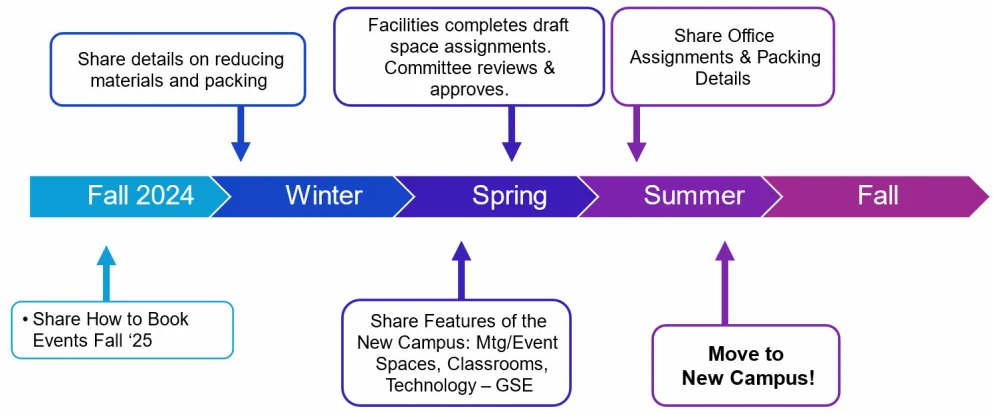Facilities Initiatives
Move-In Details
AY2024-2025 New Campus Transition Plan

Sustainability Goals and Standards
Sustainable GSE was founded to support the constituents of the Graduate School of Education, and Stanford University, in responding to and alleviating the challenges of climate change. We work to ensure that all aspects of GSE Operations are executed with sustainability in mind, helping to minimize our individual and organizational impacts on the environment.
Standard Operations:
In supporting Stanford’s goal of “Zero-Waste by 2030”, Sustainable GSE is always looking to help divert waste from landfills. Encouraging the repurposing of material goods, offering compostable and reusable products, and hiring sustainable vendors, are just some of the ways our team helps guide the GSE to a less environmentally impactful means of operating. Through these strategies, we can limit the amount of waste generated without sacrificing the comfort and effectiveness of our operations.
Examples:
- Services: We contract companies with goals that align with ours, using products that are the least impactful to the environment, to complete the services requested.
- Furniture: We utilize the Stanford Surplus channel to acquire and donate gently used furniture, preventing the unnecessary production and acquisition of products for purposes that could be fulfilled by existing supply.
- Also prevents emissions from producing and shipping new materials
- New Facilities: As we plan to move into our new campus, the GSE has looked for opportunities to avoid purchasing new materials and repurpose what we already have in our supply.
Sustainable Event Planning:
Beyond our day-to-day operations, events hold the highest potential for generating unnecessary waste, if proper measures are not taken. To address this, we have implemented practices that guide organizers towards sustainable decisions. Coupled with our event planning resources, we hope to empower event organizers to make sustainable choices that reduce environmental impact. Ready to plan your next event? Check out our Sustainable Event Planning resources.
How to Individually Contribute to a Zero-Waste Campus:
- Educate yourself on Stanford’s waste management system: Zero Waste Pilot Waste Sorting Guidelines
- Not all single-stream recycling programs accept the same items
- Sign up for a waste sorting training by emailing zerowaste@stanford.edu
- Watch the Zero Waste Building Training Video
- View the Sustainability Waste Sorting Training Module, including waste sorting game (6 minutes)
- Sort your waste using the centralized bins.
- If in doubt, find out!
- Use reusable coffee cups, water bottles and utensils. BYO!
- Compostable alternatives are great in a pinch, but are not better than reusable.
